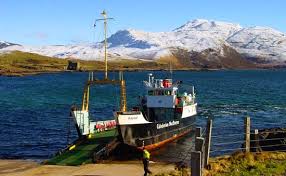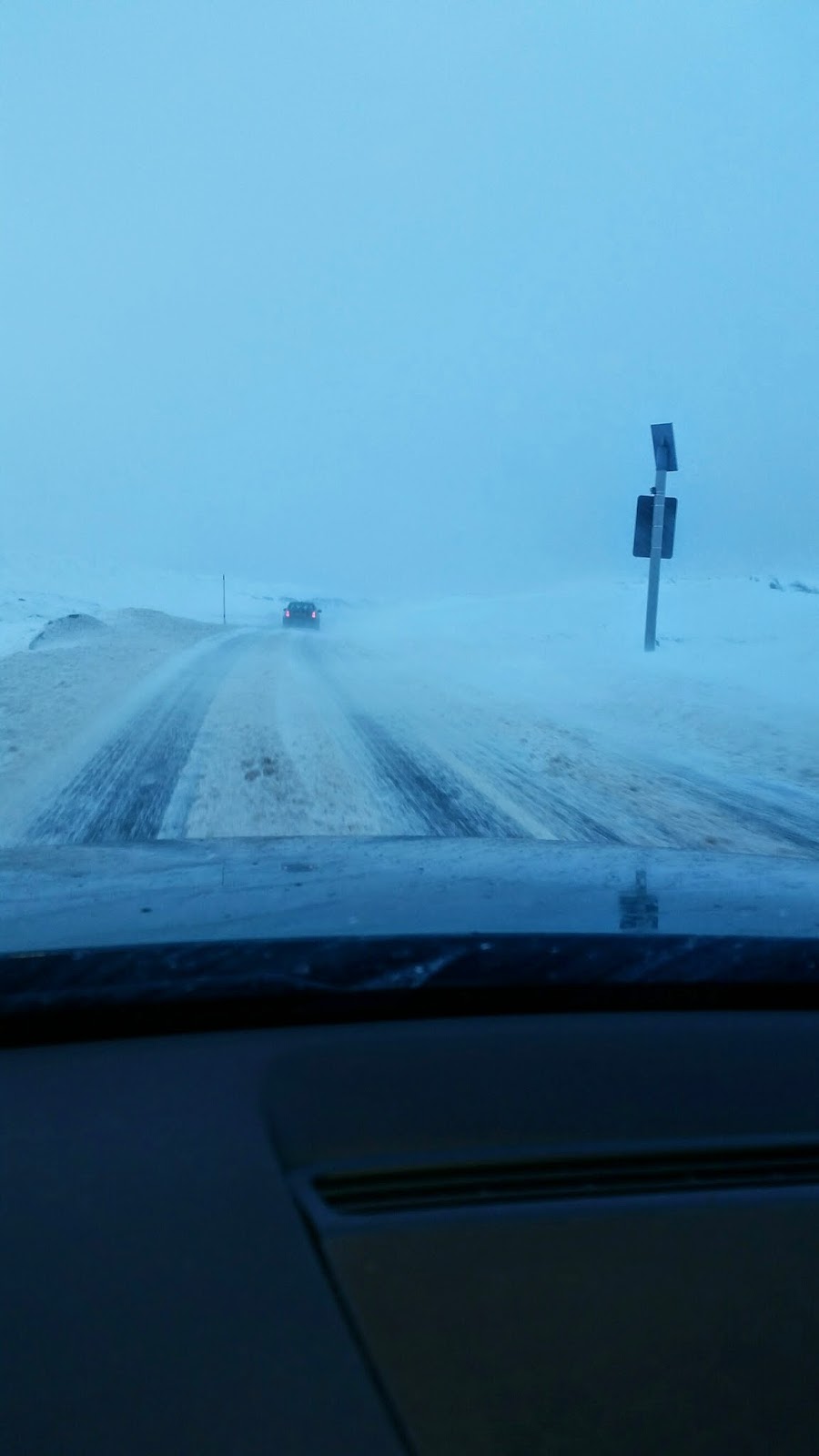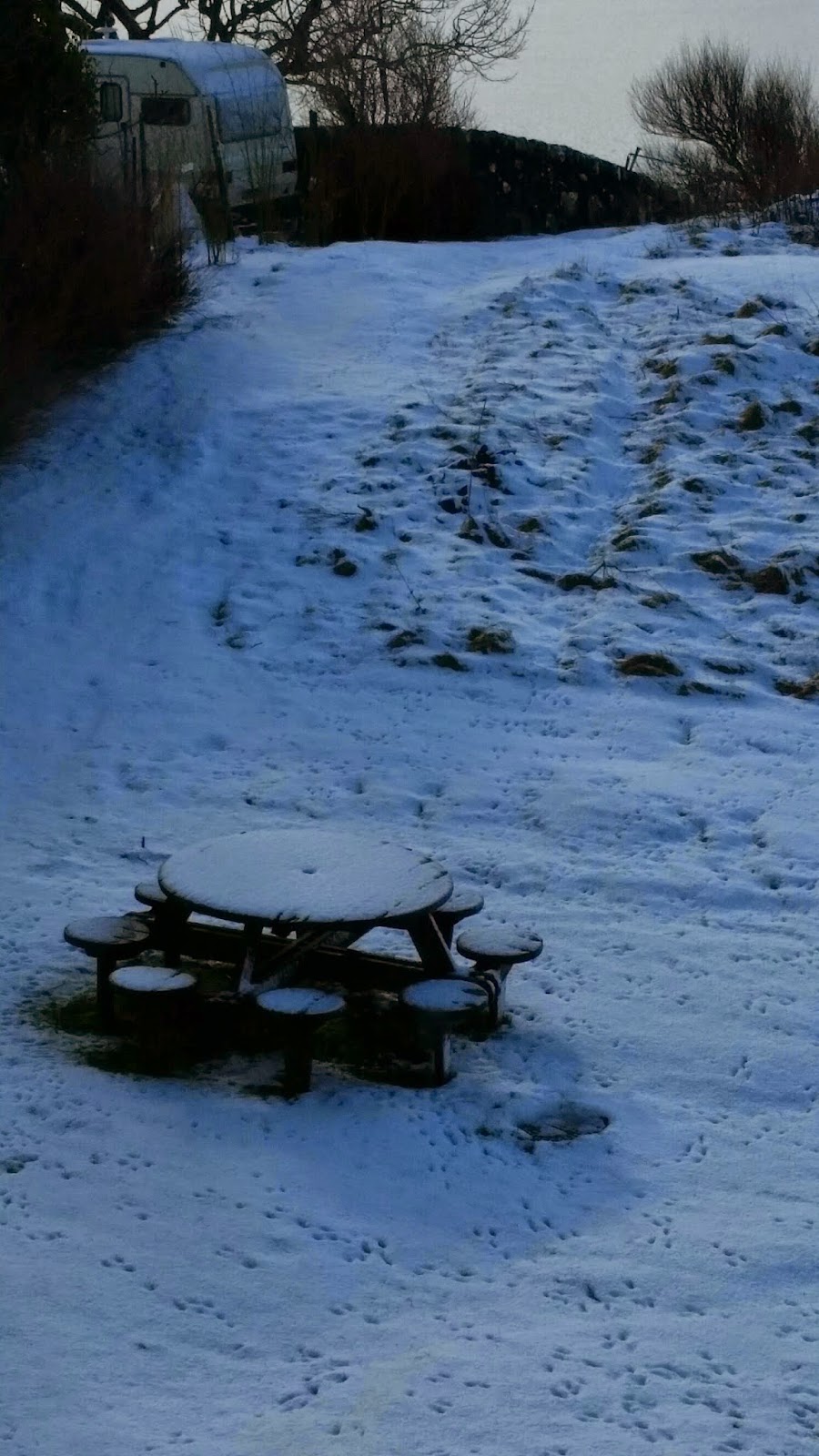Isle of Mull
Thursday
26th Feb
150 kilometres drive from Glasgow
to Oban. Some spectacular snow showers whip down from the white mountainsides
on to higher passes of the road; but the winter tyres on our Audi deal with
that.
The 45 minute sailing from Oban to
the Isle of Mull is, as always, spectacular. Out past Kerrera -where, 850 years
ago, King Hakon and the Vikings assembled their battle fleet of long ships for
their final – and unsuccessful - onslaught on the embryonic Scotland; passing
the Southern tip of the Isle of Lismore: a Livingstone
from Lismore was a spectacular casualty 100
years ago in an uprising against British imperialism in what is now Malawi; and
finally sailing in under the brooding walls of Duart Castle, from where the
MacLeans once presided over Mull before selling out to the Duke of Argyll.
 |
| Lismore |
 |
| Duart Castle |
Crab claws from Oban are dinner for
Tonya: she purrs in contentment. We settle for peat-smoked haddock. As is traditional
in the Highlands of Scotland, it is accompanied by pak choi.
I read the Stornoway Gazette. There is an obituary of the 90-yr-old Norman
Smith of Lionel Ness. I recollect some notes I made about him six months ago:-
Do you remember our father's friend Norman
Smith (brother of Alan, who had the shop in Lionel)? He ran the Decca
navigation system station on the Lionel machair. Eventually of course GPS made
the Decca multi-station system obsolete: but, for some 30 years or so from
about 1955 (although its origins were much earlier), it was magic : for ocean
liners and the mercantile marine; for deep-sea trawlers; even for
stratocruisers, Comet 4s and 707s; and (latterly) even inshore boats, including
leisure craft. It dominated (perhaps monopolised) electronic navigation systems
(especially maritime ones) in Western Europe and then more widely; and, to a lesser
extent, in North America. Essentially it was powerful and sophisticated
transmitting system with loaned i.e. rental de-coders (that is how Decca made
their money). It was essentially one-way (as GPS is)- but -unlike GPS- with two-way communication, of great power,
for inter-station communication by senior operatives - and for those whom the
senior operatives chose to indulge.
One evening, perhaps about 1955, I was
visiting an old lady (whom I think in retrospect was probably Norman's aunt);
and she said "For the first time in the many centuries we have been going
to Sulisgeir from Ness to catch the gugas, we have a system in which we can
talk to the boys in Sulisgeir." She tuned her radio to a particular
setting (not middle- wave, I seem to remember). At 6.00 p.m. Norman's voice
came across 'Calling Sulisgeir: do you read me? Over.' A stream of electronic
beeps and buzzes came back. Norman : 'So you are well. Your only problem is
that the lead-acid accumulator battery charge is getting so low that you can
only transmit to us in Morse Code. That is OK. Over.' And so the conversation
went on: English language, with a bit of Gaelic, on one side; Morse Code on the
other.
The peasants of Ness (as the Sunday Times
once infamously described them) were in the forefront of technology.
Newsnight
has a piece on the Aral Sea, a true environmental disaster of great
proportions, deprived of water by vast irrigation schemes up-river from the Sea
(mainly to irrigate cotton fields, is my recollection). Graham and I spent 2
days there on a work trip in 1999 or so. At the time I wondered why so many
people there were so obviously ill. Salt poisoning seems to be the answer:
agricultural land is contaminated with poisonous levels of sodium chloride from
the dried-up sea.
Friday
27th Feb
There is a substantial westerly
breeze coming off Loch Assapol as I wheelbarrow logs from the garden shed into
the house. A few weeks ago, the task would have left me breathless; but a
six-week exercise regime has toughened me up. So has 4 weeks of non-smoking.
Or, as my GP put it yesterday, “It is probably decelerating your decline.” My “smoking cessation” counsellor Samina (a
Glaswegian with parents from Mirpur) has been excellent; although on the couple
of occasions when she suggested some “wine cessation”, I firmly resisted the
suggestion.
With a zero-G phone signal
(although we do have a landline) and temporarily defunct broadband (taken out
by a lightning strike a few weeks back), my technological options are severely
reduced: reading books (some of them even in paper form, some on my Kindle);
TV; writing this blog; and exercise. And later today we plan to walk the four
kilometres or so to a village hostelry where we think there will be a “wi-fi
hotspot”.
Read the newspapers. I think of an ideology
embraced by millions, some of whom were ready to kill for it. An ideology hated
by almost all in the USA; and, at least in its more extreme forms, by most of Western
Europe. An ideology into which, to the horror of many, it was found that some
UK university students had been indoctrinated, some of whom then slaughtered
many people. The deadlier of them were more credible because they were such
personable ordinary and pleasant people. The ideology was not Islam but
communism; the university was not Westminster but Cambridge; the leading killer
was not Emwazi but Philby.
After some in-house exercises, we
exit at 1500 hrs for the wi-fi “hotspot”. The breeze is stiff, but it is more
or less dry. Less than an hour later we arrive at the hostelry: shut until 1700
hrs. We decide to walk a little further; to an ancient pier that served the
village until the 1960s and is still used for fishing. Some black crows flit
around in the air. But then an exquisite heron arrives, one of the most famous
and distinctive of Scottish sea birds. It sits in the sea for some time, and
then makes a languid and heavy-beating exit from the scene. As we walk back
towards the main part of the village, there is an altercation between a heron
and two crows in a wooded area. (Later Gordon tells us that that particular
area has a considerable number of herons in permanent residence- who defend
that territory with some tenacity.)
Still no action on the hostelry
front at 1645 hrs. I walk to the village shop and talk to Glen about the
minister who preached in the church next to Glen’s shop in 1933-1941. As I walk
back there is the very rare excitement of seeing the local (and part-time) fire
brigade swing into action.
The hostelry is open; their wifi is
impeccable in access and speed. So Joan and I catch with e-mail and Facebook
and BBC news and weather forecasts (“this afternoon in Bunessan is cloudy and
windy. At 1900hrs, rain will arrive”). But the hostelry still serves beer and
wine as an adjunct to its electronic services; and is filling up with a
combination of locals, some Polish workers engaged on a local building project
and a couple of tourists.
At 1900hrs or so we exit: just as
the predicted rain arrives, dead on time, sweeping in from the west. We battle
our way home. Tonya greets us mournfully “Where have you daft humans been? You
are not getting any younger, you know.”
I put on a monster fire with the
logs barrowed in in the morning. Joan cooks. Tonya eats some crab meat and she
and Joan catch up with “Pointless” on TV while I do a little writing and
editing.
Saturday
28 Feb. 15
Today is an archetypal Hebridean
winter day. The wind is not particularly high but it is constant; the rain is
not particularly heavy but it is constant. Some sheep stand morosely in the
field by the house.
The long-awaited hub/router
arrives. I am tasked to install it, but first I barrow three loads of logs to
the house front and stack them in the porch .
The afternoon is spent on
installing the new “Hub” and editing and printing a new version of the
biographical sketch that Murdo and I have written. Alexander was minister here
in this Bunessan village 1933-1941; and I have retooled our story. Deliver it
to the patriarch of the village (Glen) and go for a pint. Driving home the rain
is still relentless: last season’s lambs shelter against a dry-stone wall.
Fuel the fire with logs and coal
briquettes .
We are to have scallops (from Oban)
and roast chicken (from Sainsbury’s) for dinner.
It has been a day of failure. I
have done only 30% of my exercises; I have read only a few pages of AN Wilson
on the “post-Victorians”; I have had no outside walks; I left Joan to deal with
a valve failure in a downstairs toilet that resulted in serious water ingress
on the floor. But, I guess, I have re-installed wifi and broadband and the
supplementary electronic extension one needs in a 200-yr-old Scottish manse
with thick walls; I have built up a good in-house stock of logs (wooden
non-electronic logs that is - as opposed to my, equally wooden, electronic
efforts). And Tonya, faced with the choice between the main lounge (its fire,
Joan and the execrable “Voice”) and my study, prefers to sit contentedly on the
carpet in my “study” while I tap away at the keyboard.
The rain is off; the wind has died
down; darkness has descended on the land.
At 10.00 pm, a new storm comes in
-with some ferocity. I check the forecast: predictions are of wind speeds of
perhaps 50 kph, with gusts up to 100kph. That is OK.
Joan (in bed with smartphone ) and
I (at the computer) exchange notes on the weather:-
Oh my!! I do not think we have had such fierce winds for a long
time. Tonight it was hard to even open the front door. So I happily cooked,
ate and watched The Voice . We stoked the fire and then went to bed. We dealt
with: no broad band and a leaking toilet valve which has resulted in a very wet
toilet floor. Several slates off the roof from the last storm so I wonder how
many more off by tomorrow morning. Tonya has gone into semi-dormant mode as
expected from a smart cat. The wind is increasing as I write and Calmac
has issued an Amber warning for tomorrow. Xx
I reply:-
In the village of my childhood, to which I hope to induct Sam
and Robert soon, they would have said "Obh obh: there is a stiff breeze
tonight." What the cailleachs and the bodachs of Ness would have made
of "The Voice" or of broadband is not known. Calum Kennedy
was the "voice" and "broadband" was investing the fortune
of two pounds (£80 today) to speak at the New Year to one's émigré
daughter or son in Montreal or Toronto or Sydney.
And the cat would have indeed been semi-dormant: but outside in
a wee nook in the peat stack or in the barn. Only the collie dog would have
snoozed indoors by the peat fire.
And those with travel plans would have been secure. Between
Stornoway and Kyle of Lochalsh 1947 to 1970, David MacBrayne's "Loch
Seaforth" was cancelled only once. It is the modern high-sided and
top-heavy car ferries that find the breezes tricky. Iain
 Iain
Iain
Sunday1
March
It is drier, sunnier and less
windy. A scattering of optimistic crocuses raise their yellow heads above the
surface of the lawn. The sheep next door are positively cheerful.
A boring day, but I amuse myself
with a note on Facebook to a pal visiting Reykjavik.
‘The last, and only, occasion I was in
Reykjavik was some time ago. Two weeks earlier I had been to Staffa- where
Davie Kirkpatrick from Iona explained it was thought that the delightful Staffa
puffins come and sit beside humans because of the survival value of proximity
to humans i.e. being protected from other predator birds.
‘My Icelandic host listened to my story with
great patience and said "Icelandic puffins have no such illusions."
‘Given that both of us were dining on roast
puffin, I could see what he meant.’
There is a very encouraging note
from Professor Jim Hunter about a draft story on which Joan and I have worked.
It inspires me to two or three hours of work polishing up the paper for
(initially) private circulation.
Monday2 March
A beautiful afternoon “Let’s go for
a walk”, say I. “Give me 15 minutes” says Joan. 15 minutes later, snow sweeps
in from the west. I resort to books, indoor physical exercises and Sudoku. We
light a big log fire as an insurance against what promises to be a cold evening.
I talk to one of my brothers on
Skype.
Tuesday
3 March.
It has snowed overnight and the
ground is white. The barbecue table will be under-used:
The wind rises. As we leave the
house a text comes in to Joan: main ferry Craignure-Oban (predictably) cancelled.
There is an alternative so we keep going;
pausing only to let some semi-tame ducks waddle across the road.
We have a twenty minute ferry crossing
from Mull into the very picturesque Ardnamurchan peninsula (“a wild, remote yet beautiful place full of
wonderful scenery”). The drive is spectacular and sleet whips down from
the white-shrouded mountain-tops, but without settling on the road: in any case
we have winter tyres on the car. Not for the first time, it reminds me of the
Murree valley in winter-time. We descend to sea-level and pass the road to
Strontian: my spell-check insists on calling it “strontium”, and this is indeed
where the element strontium was first discovered.

We take the short ferry trip from
Corran; and now we are on mainland Scotland, albeit still some 140 kilometres
away from Glasgow. We climb up the road in Glencoe and now the snow is settling
on the road and drifting in the wind. A car is upside down off the road; there
is a grim beauty about the scenery; and there are plenty deer grazing, as best
they can, near the road. I drive, Joan takes photographs.
 |
| "Cruel the snow...." |
After Glencoe, it gets easier. We
arrive home after six hours of driving and ferry sailings. No problem.
Glasgow 4 March 2015










